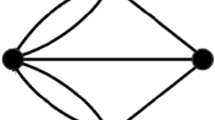Abstract
An alternative theoretical approach to the analysis for dichotomous causal systems that involve probabilistic causation, the conditional probability approach, has recently been explicated. It was shown that there exist various composition and decomposition rules for analyzing various kinds of general causal systems, and an important distinction between pure-“or”-and pure-“and”-causal systems was explicated. In this paper these earlier results are used to analyze a causal system which has been studied by J.A. Davis (1976), who uses his linear flow graph approach to analysis. The results of the conditional probability approach are compared to the linear flow graph, and it is shown that the two approaches lead to strikingly different results.
Similar content being viewed by others
References
Asher, H.B. Causal modeling. Beverly Hills, CA: Sage Publications, 1976.
Blalock, H.M. Causal inferences in nonexperimental research. New York: W.W. Norton, 1972.
Cook, T., & Campbell, D.T. Quasi-experimentation. Chicago: Rand McNally, 1979.
Cartwright, N. Causal Laws and Effective Strategies, Nous 13, 419–437, 1979.
Davis, J.A. Analyzing contingency tables with linear flow graphs: D. Systems. In D.R. Heise (Ed.), Sociological methodology 1976, pp. 111–145. San Francisco: Jossey-Bass Publishers, 1975.
Duncan, O.D. Introduction to structural equation models. New York: Academic Press, 1975.
Ellett, F.S., Jr. Ericson, D.P., On The Logic of Causal Methods in Social Science, Synthese, 57, 67–82, 1983.
Ellett, F.S., Jr. Ericson, D.P., Probabilistic Causal Systems and the Conditional Probability Approach to Causal Analysis. Quality and Quantity, 18, 247–259, 1984.
Heise, D. Causal analysis. New York: Wiley, 1975.
Kenny, D.A. Correlation and causation. New York: Wiley, 1979.
Mackie, J.L. The Cement of the Universe Oxford: Clarendon Press, 1974.
Salmon, W.C. Probabilistic Causality. Pacific Philosophical Quarterly, 61 Nos. 1 and 2, January-April 1980.
Salmon, W.C., with contributions by R.C. Jeffrey and J.G. Greeno. Statistical Explanation and Statistical Relevance. Pittsburg, PA: University of Pittsburg, 1971.
Simon, H. Models of man. New York: Wiley, 1957.
Suppes, P. A probabilistic theory of causation. Amsterdam: North-Holland, 1970.
Author information
Authors and Affiliations
Rights and permissions
About this article
Cite this article
Ellett, F.S., Ericson, D.P. The conditional probability and the linear flow graph approaches to analyzing probabilistic causal systems. Qual Quant 20, 147–156 (1986). https://doi.org/10.1007/BF00227421
Issue Date:
DOI: https://doi.org/10.1007/BF00227421




